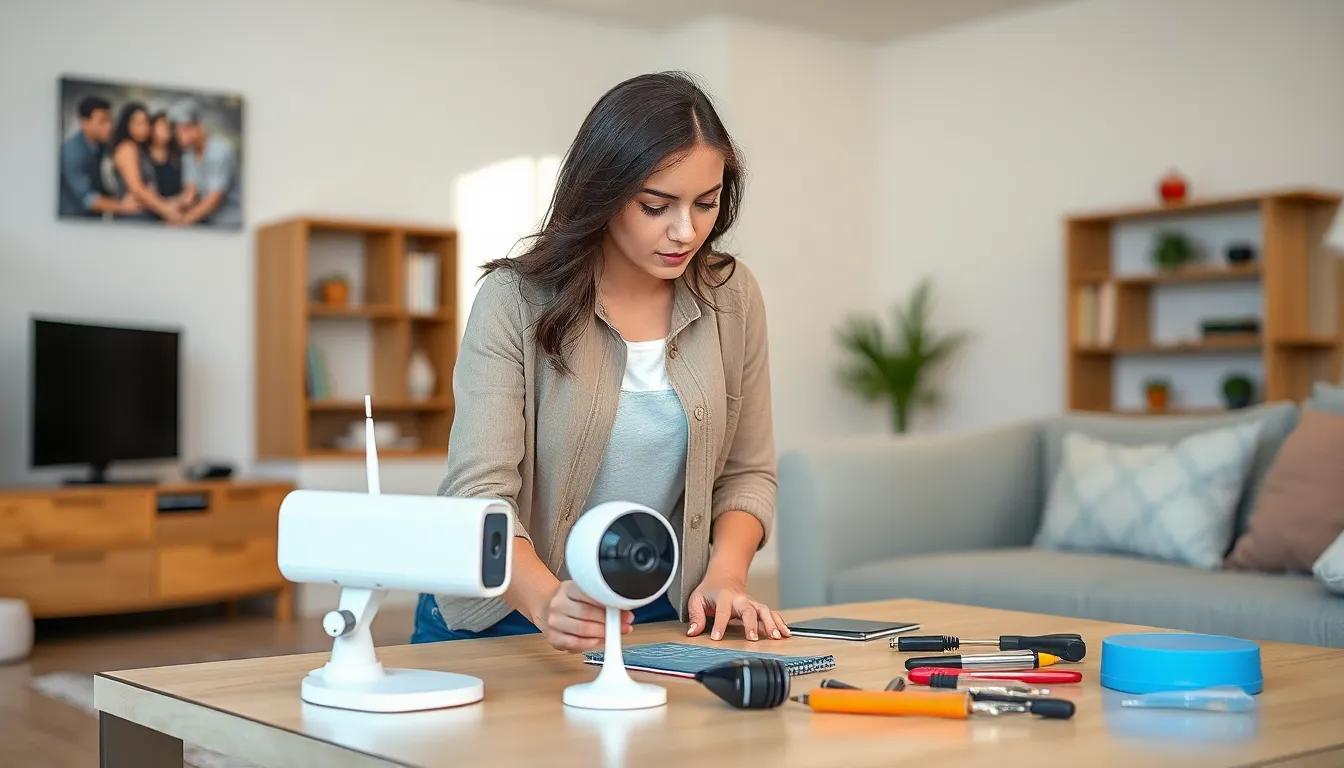In a world where doorbells are smarter than the average human, home security system installers are the unsung heroes of peace of mind. They’re the tech-savvy wizards who transform ordinary homes into fortresses, complete with cameras that could rival a Hollywood blockbuster. Who wouldn’t want a security system that alerts you when your cat decides to host a midnight dance party?
But it’s not just about protection; it’s about convenience too. With a flick of a finger, homeowners can monitor their castle from anywhere—yes, even while lounging on the beach. Investing in a professional installer means you’ll get a tailored system that fits your needs like a glove, ensuring your home is as secure as it is stylish. So, let’s dive into the world of home security and discover why these installers are the secret sauce to safeguarding your sanctuary.
Table of Contents
ToggleImportance Of Home Security Systems
Home security systems play a vital role in protecting residences from threats. These systems act as a deterrent against potential intruders, enhancing the safety of both family and property. Advanced technology, including surveillance cameras and motion detectors, provides homeowners with real-time awareness of their surroundings.
Monitoring remains a key feature of modern home security systems. It allows property owners to keep an eye on their homes even when they’re away. Remote access through smartphones makes it convenient for individuals to check on activities, providing peace of mind.
Investment in home security systems increases property value. Properties with installed security systems attract more buyers in a competitive real estate market. Safety features not only protect physical belongings but also promote a sense of well-being for residents.
Insurance benefits also accompany home security systems. Many insurance providers offer discounts on premiums when homeowners install security measures. Utilizing these systems can lead to lower costs over time, providing both financial and protective advantages.
Customization serves as another crucial aspect. Home security installers tailor systems to meet individual needs and preferences, ensuring optimal functionality. Different families require different levels of security based on their specific circumstances, showing the importance of personalized setups.
Home security systems offer more than just basic protection. They enhance safety, convenience, property value, and savings on insurance. Prioritizing a professional installation maximizes these benefits for any household.
Types Of Home Security Systems

Home security systems come in various types, catering to different needs and preferences. Understanding these options helps homeowners choose the system that best fits their lifestyle.
Wired Systems
Wired security systems rely on physical connections between components. These setups typically connect cameras, sensors, and alarms via cables to a central control panel, ensuring reliable communication. Longevity defines wired systems, as they often require less maintenance compared to wireless counterparts. Installation can be more labor-intensive due to the need for drilling and routing cables throughout the home. These systems might provide a stable and continuous power source, which is crucial for uninterrupted surveillance. Additionally, homeowners often appreciate the absence of interference from wireless signals, making wired systems highly dependable.
Wireless Systems
Wireless security systems utilize radio signals to transmit data. Homeowners benefit from easy installation since these systems don’t rely on extensive wiring. Flexibility stands out, allowing homeowners to reposition cameras and sensors without hassle. Battery-operated components provide freedom from electrical outlets, enhancing placement options. Users enjoy the convenience of remote access through smartphones, providing real-time monitoring from anywhere. Wireless systems often feature advanced technology like motion detection and facial recognition, boosting their functionality. Homeowners seeking customizable solutions may find wireless options more appealing due to their adaptability.
Choosing The Right Installer
Selecting a qualified home security system installer is crucial. An ideal installer not only possesses the necessary skills but also understands the unique needs of each homeowner.
Qualifications To Look For
Experience ranks high on the list of desirable qualifications. An installer with a proven track record demonstrates reliability and expertise. Licensing also plays a significant role; ensure the installer holds valid credentials required by state regulations. Certifications from recognized organizations, like the Electronic Security Association, indicate professionalism. Knowledge of various security technologies showcases adaptability to new systems. Look for references or reviews from previous clients to gauge satisfaction.
Questions To Ask An Installer
Asking the right questions helps assess an installer’s suitability. Inquire about their experience with similar systems and types of installations. Ask for details related to warranties on equipment and installation services. Clarification on response times for monitoring services is essential for peace of mind. Discuss customization options available for specific security needs to ensure that the system matches homeowner preferences. Understanding their approach to ongoing support and maintenance presents a clearer picture of their commitment to service quality.
The Installation Process
The installation process for home security systems involves several key steps to ensure optimal performance and homeowner satisfaction.
Pre-Installation Assessment
Installers conduct a thorough assessment before any equipment goes in. This evaluation identifies specific security needs unique to each property. Assessors look at entry points, blind spots, and potential vulnerabilities in the home. They also consider factors like the layout, any existing security features, and homeowners’ concerns. Detailed discussions about preferences and budget help tailor the system. Installers may recommend specific equipment options that fit both the property and the family’s lifestyle. This personalized approach lays the foundation for an effective security setup.
Post-Installation Support
Post-installation support is crucial for maintaining system effectiveness. Installers usually provide comprehensive training on using the security system. They ensure homeowners understand all features, including mobile monitoring and alert systems. Additionally, ongoing technical support is often available to troubleshoot issues. Many companies offer warranties for equipment and services, giving homeowners peace of mind. Regular maintenance checks from installers guarantee the system runs smoothly over time. This proactive approach ensures that security measures remain effective against evolving threats.
Cost Considerations
Cost plays a significant role when selecting a home security system. Various factors influence the overall expense, including equipment, installation, and maintenance fees. Homeowners often face choices between wired systems and wireless solutions, each with its unique pricing structure.
Wired systems can be more costly upfront due to labor-intensive installation processes, involving extensive wiring throughout the property. Wireless systems typically incur lower installation costs, as they require less physical work and provide ease of modification and updates. However, homeowners should also consider the long-term costs associated with both options, such as potential maintenance and equipment replacement.
Understanding the pricing range for different systems helps homeowners budget effectively. Basic security packages may start from $300, while comprehensive setups can exceed $1,500 depending on features and customization. Additional costs may arise from monitoring services, with monthly fees averaging between $20 and $60.
Insurance companies often provide discounts for homes equipped with security systems, creating a financial incentive to invest in these installations. Such savings can offset installation and monitoring costs.
Post-installation services, including maintenance and technical support, may add to the total price. It’s essential to clarify these aspects with the installer to avoid unexpected expenses. Prioritizing reliable, qualified installers may increase costs initially but results in higher-quality systems that provide security and peace of mind. Investing wisely in both hardware and professional installation yields long-lasting benefits, ensuring the home remains a secure environment.
Investing in a home security system is a proactive step towards ensuring safety and peace of mind. By hiring qualified installers, homeowners can benefit from customized solutions tailored to their unique needs. This professional guidance not only enhances security but also adds value to the property.
With the right system in place, homeowners can enjoy the convenience of remote monitoring and real-time alerts. Such features not only deter potential intruders but also foster a sense of control over one’s living environment. Ultimately, a well-installed security system serves as a vital investment in both protection and comfort.


